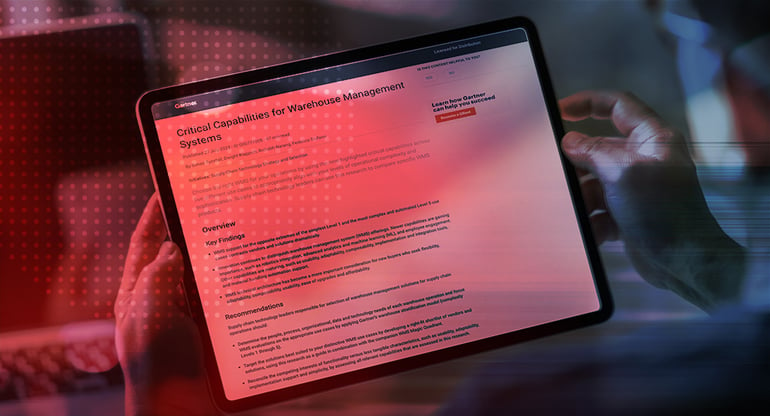Why We Believe You Need Both Gartner® Magic Quadrant™ and Critical Capabilities Reports to Choose Warehouse Management Software

In the world of warehouse management software (WMS), choosing the right solution can be a complex task. As a part of a selection team, it's crucial to have access to trusted research and analysis to make informed decisions. This is where we believe the Gartner® Magic Quadrant™ and Critical Capabilities reports become indispensable.
So, what's the difference between these two valuable resources, and why should you use both the Gartner® Magic Quadrant™ and Critical Capabilities reports when selecting potential vendors of warehouse software? Let’s take a look.
Gartner® Magic Quadrant™ Report
Imagine you're looking at a list of the WMS vendors in the Magic Quadrant report.
By applying a graphical treatment and a uniform set of evaluation criteria, a Magic Quadrant™ helps you quickly ascertain how well technology providers are executing their stated visions and how well they are performing against Gartner’s market view. A Gartner Magic Quadrant is a culmination of research in a specific market, giving you a wide-angle view of the relative positions of the market’s competitors.1
This report can provide you with valuable insights into different vendor profiles and evaluate who you feel is the right kind of fit as a partner for your project and organization.
Gartner® Critical Capabilities Report
We feel the Critical Capabilities report is your toolbox.
Gartner says, “It enables you to choose the right WMS for your operations by using the nine highlighted Critical Capabilities across five different Use Cases to appropriately align with your levels of operational complexity and sophistication.”
The Critical Capabilities report makes sure you are looking at the key features that are a match for your priorities.
As an essential companion to the Gartner Magic Quadrant, this methodology provides deeper insight into providers’ product and service offerings by extending the Magic Quadrant analysis. Use this research to further investigate product and service ratings based on key capabilities set to important, differentiating use cases.
Why You Should Use Both Reports - Our Opinion
Why settle for just one report when you can have both? The Magic Quadrant™ provides a high-level view of the vendor landscape, allowing you to understand and evaluate various recognized vendors.
Meanwhile, the Critical Capabilities report dives into the specific features and functions of each product, helping you identify the WMS that best fits your operational needs.
“Keep in mind that focusing on the leaders’ quadrant isn’t always the best course of action. There are good reasons to consider market challengers. And a niche player may support your needs better than a market leader. It all depends on how the provider aligns with your business goals.”1
For instance, suppose you are looking for a WMS that excels in data analytics and reporting capabilities may be something that offers a digital twin of your warehouse operation.
As an essential companion to the Gartner Magic Quadrant, the Critical Capabilities reports provides deeper insight into providers’ product and service offerings by extending the Magic Quadrant analysis.
For an operations or warehouse manager tasked with selecting a warehouse management software, using both the Gartner® Magic Quadrant™ and Critical Capabilities reports, we feel it will provide a holistic approach to vendor selection.
We think it enables you to identify vendors that are both well positioned in the marketplace and aligned with your specific operational needs. In a rapidly evolving industry, having access to such trusted analysis and research is invaluable for making informed and future-proof decisions.
Add attribution and disclaimers:
Gartner, Magic Quadrant for Warehouse Management Systems, 08 May 2023, Simon Tunstall, et. Al. Gartner, Critical Capabilities for Warehouse Management Systems, 27 July 2023, Simon Tunstall, et. Al. Gartner does not endorse any vendor, product or service depicted in its research publications, and does not advise technology users to select only those vendors with the highest ratings or other designation. Gartner research publications consist of the opinions of Gartner’s research organization and should not be construed as statements of fact. Gartner disclaims all warranties, expressed or implied, with respect to this research, including any warranties of merchantability or fitness for a particular purpose.
GARTNER is a registered trademark and service mark, and MAGIC QUADRANT is a registered trademark of Gartner, Inc. and/or its affiliates in the U.S. and internationally and are used herein with permission. All rights reserved.
1 https://www.gartner.com/en/research/methodologies/magic-quadrants-research



